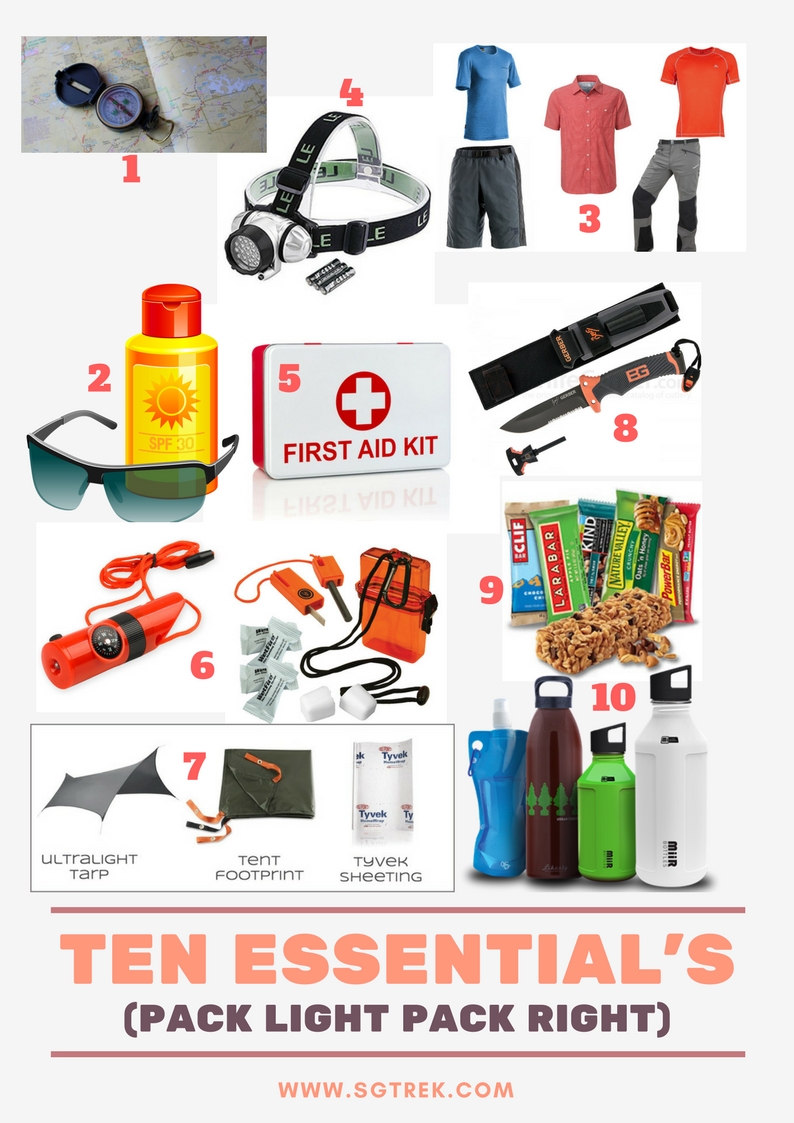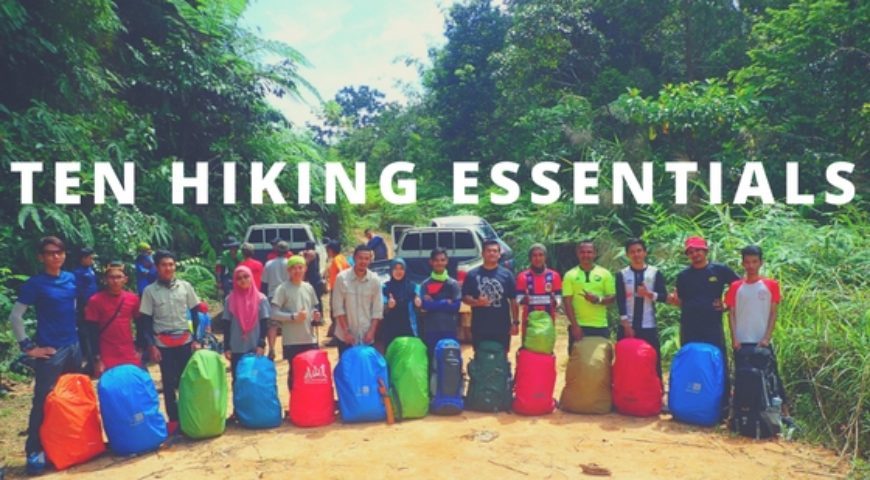Pack Light Pack Right: Packing the right things for hiking is very essential for beginners even if it’s a day hike. You may not use all the items for the day, but it’s a good habit. You’ll probably appreciate the value of these TEN ESSENTIALS one day when you reallyneed one of them.
Ten Essentials
- Maps and compass (Navigation)
- Sunglasses and sunscreen (Sun Protection)
- Extra clothing
- Headlamp/flashlight/Spare batteries
- First-aid supplies
- Fire starter Kit (lighter/waterproof match/whistle)
- Emergency Shelter
- Knife & repair kit tools
- Extra food
- Hydration (extra water)

The purpose of Ten Essentials list has always been to answer two basic questions:
- Can you respond positively to an accident or emergency?
- Can you safely spend a night (or more) outside?
The list has evolved over time from a list of individual items to a list of functional systems
- Maps and compass (Navigation): Modern technology has changed the equipment over the years. With better navigation systems GPS has overtaken maps and compass. Always carry a map and compass as a backup. A map and compass not only tell you where you are and how far you have to go, it can help you find campsites, water, and an emergency exit route in case of an accident.
- Sunglasses and sunscreen (Sun Protection): Carry and wear sunglasses, sunscreen for the lips and skin, and clothing for sun protection. Usually in the snow, glacier area you’ll need sunglasses to prevent snow blindness and sunscreen to prevent sunburn. You’ll need extra-dark glacier glasses if you’re planning prolonged travel on snow or ice.
- Extra clothing: How much extra to pack is always the question asked by many climbers. Most of the climbers usually wear all the basic attire while hiking. “Extra Clothing” refers to the additional layer needed to survive the worst conditions that could possibly encounter on the trips. Always plan the extra clothing based on the weather and the season of the region you going to hike.
- Headlamp/flashlight/Spare batteries: These are light of source during the nightfall. Benefits of having a head lamps allows a hands free actions while hiking in the dark. Always ensure to carry spare batteries at all times.
- First-aid supplies: First aid kits are easily available in the market nowadays to just buy of the shelf. Do make sure you know how to use it also. Take proper First Aid courses to attain more knowledge.
- Fire starter Kit (lighter/waterproof match/whistle): Fire starters are very useful during the stranded nights to keep you warm. Fires are also a great way to signal for help if you get lost. If lost, you’ll also want the whistle as it is more effective than using your voice to call for help (use 3 short bursts).
- Emergency Shelter: Making shift make shelters is very important when you are lost in the woods. Options include an ultra light tarp, a bivy sack, an emergency space blanket (which packs small and weighs just few grams.), even a large plastic trash bag. Carry a reflective emergency blanket it can also be used in administering first aid to an injured or hypothermic person.
- Knife & repair kit tools: Knives are so useful in first aid, food preparation, repairs, it come very handy tool during an emergency needs. Repair Kits can include anything that might be handy during an outdoor adventure or emergency like a pocket knife, duct tape on a water bottle (pictured), extra lashing straps or bungee cords.
- Extra food: For every hike you need to bring more food than you actually need for the day. In case of emergency when you get lost extra food will help keep up energy and morale. General rule is to bring enough food in case you unexpectedly spend the night in the wilderness on a day hike.
- Hydration (extra water): Carry sufficient water for the hike at all time and have the skills and tools required for obtaining and purifying additional water. You should also carry some means for treating water, whether it is a filter/purifier or chemical treatment.
Each traveler should carry these 10 essentials for every adventure and know how to use each of the items. Should you get separated from your group or lost in the nature, having these basics and knowing how to use them could give you the ability to survive. Knowledge and Skills could save your lives on mountain.
Having items in your pack has no value unless you understand how to use them.
“SAFETY IS GAINFUL, ACCIDENT IS PAINFUL” – HIKE SAFELY




